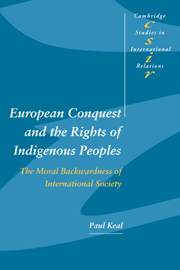 European Conquest and the Rights of Indigenous Peoples
European Conquest and the Rights of Indigenous Peoples Published online by Cambridge University Press: 03 December 2009
So far I have been concerned with the past and have deliberately used the broad term ‘non-Europeans’. The focus of this chapter shifts to the quest of contemporary indigenous peoples for the core right of self-determination. The bulk of non-European peoples that had been subjugated by European peoples achieved formal self-determination as a result of decolonisation following World War Two. Decolonisation did not, however, give self-determination to numerous indigenous peoples enclosed in new states such as India or Indonesia. For many of them decolonisation merely meant exchanging one set of colonial masters for another. In former colonies such as Australia, New Zealand and Canada, which had achieved independent status much earlier, it did nothing to change the situation of indigenous peoples who had been dispossessed of their lands and both lost control over their affairs and were often denied the full rights of citizenship. The loss of these was connected, in Chapter 3, with international law as a discourse that aided and justified the dispossession of land and rights, but it can no longer be viewed in this way. James Anaya shows that international law now ‘includes a certain universe of norms and procedures that benefit indigenous peoples’. It now challenges the legacy of dispossession ‘and the forces that would see it continue’. The displacement of natural by positive law, also noted in Chapter 3, established states as the subjects of international law and gave individuals a place mainly as citizens of states.
To save this book to your Kindle, first ensure [email protected] is added to your Approved Personal Document E-mail List under your Personal Document Settings on the Manage Your Content and Devices page of your Amazon account. Then enter the ‘name’ part of your Kindle email address below. Find out more about saving to your Kindle.
Note you can select to save to either the @free.kindle.com or @kindle.com variations. ‘@free.kindle.com’ emails are free but can only be saved to your device when it is connected to wi-fi. ‘@kindle.com’ emails can be delivered even when you are not connected to wi-fi, but note that service fees apply.
Find out more about the Kindle Personal Document Service.
To save content items to your account, please confirm that you agree to abide by our usage policies. If this is the first time you use this feature, you will be asked to authorise Cambridge Core to connect with your account. Find out more about saving content to Dropbox.
To save content items to your account, please confirm that you agree to abide by our usage policies. If this is the first time you use this feature, you will be asked to authorise Cambridge Core to connect with your account. Find out more about saving content to Google Drive.